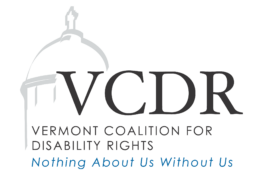

Sarah’s Story: A Discussion on Mental Health
By Shannan Fields, Integrated Marketing Coordinator Apr. 30, 2019
Sarah Launderville has found success as the executive director for the Vermont Center for Independent Living, an adjunct faculty member for Springfield College St. Johnsbury, and alumna of Springfield College, but the journey wasn’t always a smooth one. Sarah sat down with Integrated Marketing Coordinator Shannan Fields to discuss her struggles with mental health as a student and “how she found her voice.”
I recently had the opportunity to speak with Sarah Launderville, executive director of the Vermont Center for Independent Living, adjunct faculty member, and alumna of Springfield College. We cleared our schedules to discuss mental health and the student experience. In addition to having her own experiences with mental health, Launderville has been an advocate for people with disabilities since 1997. During our conversation, we explored Launderville’s journey with mental health while being a student, and how she found her voice.
Launderville was a passionate youth with a dream to become an elementary school teacher. Her initial college experience was her first time living on her own and she felt free and independent. But she also felt “a bit different.” Her symptoms became worse at school and she hid that she was hearing voices and wasn’t able to remember large periods of time. Soon she began failing her classes. She was advised to go to the school’s counselor, who was helpful but could not provide her with the support she needed. The school administration suggested she go back home and take a couple of classes at a local college before coming back. She did just that, unfortunately when she tried to return the school did not allow her back. At that time her dreams were cut short and she felt worthless. “I didn’t have the years of experience where I could advocate for myself. I was really at a low point, which led me to go home and live with my family again, but my symptoms just kept getting worse. That coupled with the feeling of…worthlessness led to my first hospitalization.”
This was her first of 14 hospitalizations. Knowing that this wasn’t a sustainable solution her parents and doctors worked to move her to a group home in Vermont. She began a teaching job but was fired after they learned about her diagnosis. Her case manager helped her to apply for and begin receiving a disability benefit as she looked for more work.
Despite the support, these experiences led to shame. “I was really embarrassed about the diagnoses I had been given, I certainly didn’t feel any self-worth and that’s taken a really long time to get to the point where I could have a good amount of self-esteem… I didn’t want people to know I lived in a group home… and so there was another level of shame that came from being on benefits, public benefits, living in subsidized housing because I couldn’t afford to live in a traditional apartment. Those pieces of shame kind of…piled on and I saw my mental health issues as a barrier to me being like everyone else and being able to get and keep employment and finish school.”
As she was searching for work, she found an ad for a personal assistant position at the Vermont Center for Independent Living. This interview would change the trajectory of her life. As she sat down for her interview, she realized she was experiencing a different reality than what she had so far. “Everyone around the table had a disability of some sort and they talked to me about disabilities being part of the human experience and they talked to me about disability pride… I felt really comfortable… I really wanted to spend time with this organization and with these people…” She ended up getting the job, but it was still several years before she found her voice. One of the moments she credits for becoming an advocate for herself happened after she joined a grassroots group called ADAPT. ADAPT held a public forum and invited decision and lawmakers from Washington D.C. to hear stories from individuals who lived in institutions—defined as nursing homes, mental health, or other developmental disability institutions.
